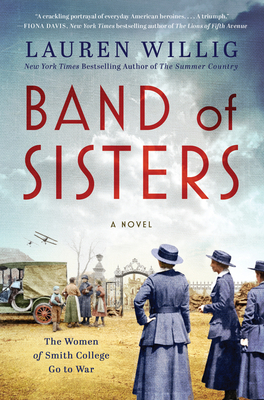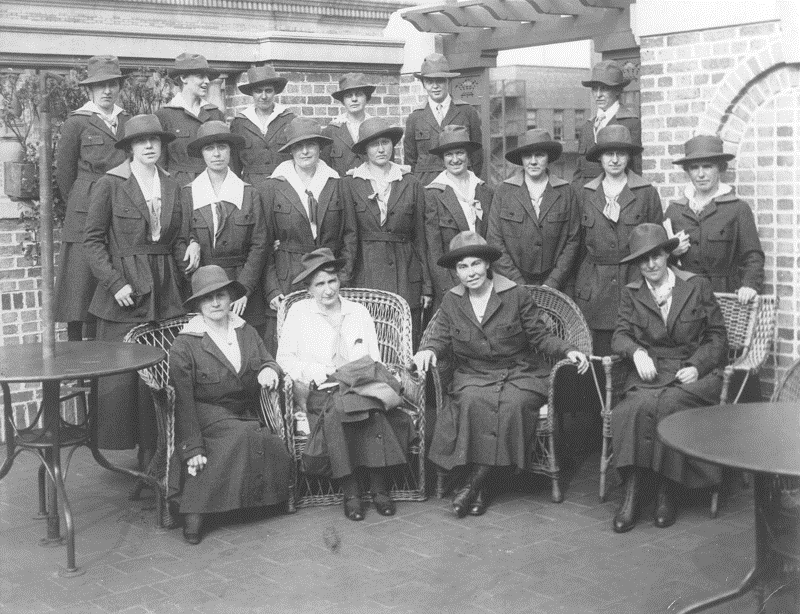 Band of Sisters by Lauren Willig
Band of Sisters by Lauren Willig Format: eARC
Source: supplied by publisher via Edelweiss
Formats available: hardcover, paperback, ebook, audiobook
Genres: historical fiction, World War I
Pages: 528
Published by William Morrow on March 2, 2021
Purchasing Info: Author's Website, Publisher's Website, Amazon, Barnes & Noble, Kobo, Bookshop.org
Goodreads
A group of young women from Smith College risk their lives in France at the height of World War I in this sweeping novel based on a true story—a skillful blend of Call the Midwife and The Alice Network—from New York Times bestselling author Lauren Willig.
A scholarship girl from Brooklyn, Kate Moran thought she found a place among Smith’s Mayflower descendants, only to have her illusions dashed the summer after graduation. When charismatic alumna Betsy Rutherford delivers a rousing speech at the Smith College Club in April of 1917, looking for volunteers to help French civilians decimated by the German war machine, Kate is too busy earning her living to even think of taking up the call. But when her former best friend Emmeline Van Alden reaches out and begs her to take the place of a girl who had to drop out, Kate reluctantly agrees to join the new Smith College Relief Unit.
Four months later, Kate and seventeen other Smithies, including two trailblazing female doctors, set sail for France. The volunteers are armed with money, supplies, and good intentions—all of which immediately go astray. The chateau that was to be their headquarters is a half-burnt ruin. The villagers they meet are in desperate straits: women and children huddling in damp cellars, their crops destroyed and their wells poisoned.
Despite constant shelling from the Germans, French bureaucracy, and the threat of being ousted by the British army, the Smith volunteers bring welcome aid—and hope—to the region. But can they survive their own differences? As they cope with the hardships and terrors of the war, Kate and her colleagues find themselves navigating old rivalries and new betrayals which threaten the very existence of the Unit.
With the Germans threatening to break through the lines, can the Smith Unit pull together and be truly a band of sisters?
My Review:
On “the eleventh hour of the eleventh day of the eleventh month” of 1918, the guns of World War I finally went silent after four years of a hellish war that was supposed to have ended all wars. Which unfortunately it did not.
This day is now celebrated as Veterans’ Day in the United States, Remembrance Day in the United Kingdom and many Commonwealth countries and Armistice Day in France, where this story takes place. And where the story that inspired it took place in real life..
This is one of those stories, one of those situations, where it’s a good thing that there is historical evidence to back up its main premise, as the idea seems a bit stranger than fiction. But then, fiction has to at least seem plausible, where history just has to have really happened, plausible or not.
The Smith College Relief Unit really happened. A group of Smith College alumnae organized themselves into a self-contained unit of unprepared, under-equipped and overly naïve aid workers who were not nurses – although two were doctors – to go to recently liberated and bombed out villages in war-torn France, in 1917. While the war was still being fought.
The trenches were practically next-door, to the point where they could feel the ground shake during major troop movements even when they couldn’t see or hear the artillery. Not that they didn’t get bombed.
The SCRU reads a bit like the American version of noblesse oblige combined with too much idealism and not nearly enough preparation. The intention was for the women to provide aid and succor along with bootstrapping for a lot of tiny communities that had lost everything; their homes, their families, their livelihoods and their souls. To set up schools for children who had lived under threat for so long that they had not known anything else. To provide seeds and farm machinery and hope in places that hadn’t seen any of the above through all the long years of the German Occupation.
And help they did, even if not always in the way that they had intended, and not nearly as much as they hoped. Some of them managed to rise above their preconceived notions about themselves, each other and the people they came to serve. Some did not.
But the story of this bunch of well-meaning if not always well-doing women was real. This did happen and they did try in spite of the conditions and the dangers and the odds.
This is their story, even if it is a bit fictionalized. Many of the names have been changed. Some of the incidents have been shifted in time, although in the main they really happened. And the letter and diary entries that head each chapter are entirely real, first person accounts of the biggest and most heartbreaking adventure any of them would ever take.

Escape Rating A: Today is Veterans Day in the U.S. My posts on this day fall into one of three categories, either I post about the holiday, I post about World War I, or, like today, I post a review of a book about World War I.
Band of Sisters is a marvelous, surprising, sometimes heartwarming and often heartbreaking book about World War I. If it sounds right up your alley, I also recommend Sisters of the Great War by Suzanne Feldman and the story collection Fall of Poppies, featuring a remarkable selection of stories that are set on Armistice Day, as this holiday is known in Britain and the Commonwealth countries.
Band of Sisters is one of those “fiction is the lie that tells the truth” kind of stories, and that’s what makes it so fascinating. Our perspective on the Smith College Relief Unit is through the eyes and words of the women in the unit, but especially through Emmie Van Alden and her college roommate and best friend, Kate Moran.
Emmie is the daughter of just the type of wealthy family that made up the usual run of Smith alumnae. As awkward and inadequate as her family frequently makes Emmie feel, she still wields her extreme privilege so naturally and so casually that she doesn’t notice how much it shapes and wounds her friend Kate.
Because Kate was a charity case, both for Emmie’s family and at Smith. She’s now middle class, she’s Catholic, and once upon a time her mother worked as a cleaner to make ends barely meet for her daughter and her widowed self. Emmie may not think of Kate as an outsider, but the rest of the group does so at every turn – and that casual malice can be brutal.
The same kind of casual malice and well-aimed social weaponry that stripped the founder of the unit of her position and her cause. A weapon that has Kate in its sights from the moment she becomes the new deputy.
But the group also perseveres in something that would now be called the “hearts and minds” plan. The war is still raging, the U.S. is in but Germany is not yet out, and the SCRU is stationed entirely too close to the front lines, trying their kind hearted but not always well-conceived best to bring milk, medicine and hope to people who have known none of the above for entirely too long.
They are not trained. They are not prepared. Still they do their best. It might not be enough, but it is certainly something. And it makes for an absorbing and marvelous read, particularly apropos for this day.





















I always appreciate your Veterans Day posts. Thanks for the review–this has gone on my wish list.
I always appreciate your comments. Thank you!
Marlene Harris recently posted..Review: Noor by Nnedi Okorafor